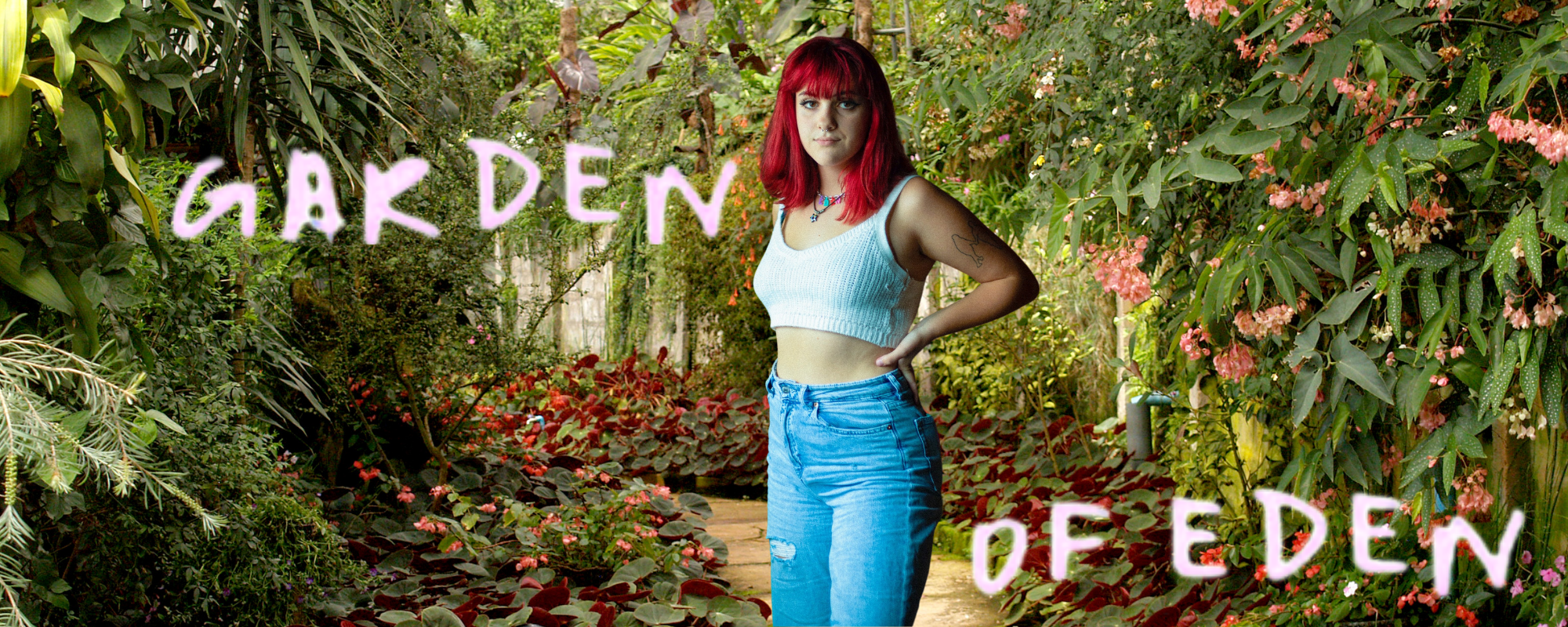With Her Second EP, Julianna Joy’s Garden Only Grows
By Maura Cowan
When she greeted me over Zoom, Julianna Joy (she/her) was just days from releasing her sophomore EP, Garden of Eden, but you would never have guessed it from her demeanor. Wrapped in a blanket with the lights dimmed in her family home in Los Angeles, she had an aura of preternatural chill–the kind one can only have, perhaps, when they are 20 years old and completely sure of their dreams.
Garden of Eden, released on February 11th, arrived almost exactly two years after her 2020 debut EP, Cherries. The timing there was not entirely intentional but definitely conspicuous, Joy said. After all, it is near impossible for her not to look at her career through the timeline of the COVID-19 pandemic.
“Basically, I dropped [Cherries], and I had a bunch of plans for its release–shows, promotional stuff, I’d just come out to Los Angeles,” she said. “And then almost immediately, COVID happened.”
What followed was two years of development, production, and marketing, largely from Joy’s own home. She has been far from silent in between these larger releases though, keeping a consistent output even through the isolation with a collection of singles. If anything, the pandemic has helped her grow her career (albeit remotely); recently, Cherries reached 3 million streams on Spotify.
“It’s just insane. I’m still processing how many people have connected to these songs that I wrote when I was sixteen with nothing figured out,” she said. “That’s part of the reason I love talking to people online. It means a lot to know that something I made helped them or hit them in a certain way.”
Being active on social media, she said, was an essential part of her career even before the pandemic. She is, after all, part of a generation of artists that was raised on the Internet, so marketing herself from the comfort of her bedroom has felt entirely natural.
“I very much grew up terminally online, but the great thing is that we all did,” she said with a grin. “I’m seeing that in a lot of these other pop artists around my age… we just get how social media works and how to engage with people on the internet.”
Offline, on the other hand, Joy said that “playing the game” doesn’t come as easily.
“A lot of the ‘pop star’ routine feels very against my nature,” she said. “I hate networking. I hate feeling like I’m being fake or trying to get in with people all the time. I just want everyone to be my friend!”
Despite this discomfort, Joy’s career is blossoming with each release. Much of this, she said, has been propelled by the support of her family, who moved out to Los Angeles from the Chicago area to help her establish herself in the industry.
“My parents have been insanely supportive, which I really appreciate, of course,” she said. “It’s also been very helpful because I don’t have management right now, so my mom has been really acting as a manager as well as a parent. She’s the reason that a lot of this is even possible.”
Even without a label, however, Joy has been far from alone in her production process; behind the scenes, she already boasts an impressive repertoire of creative collaborators. Her 2020 single “Orange” was created with rising star producer Juan Ariza, and Garden of Eden was co-written and produced by industry veteran Teddy Geiger. But in particular, she said, forming friendships with other artists has been essential to her process.
“Most of my friends out here are songwriters, and we’ve formed this really nice support network where we all bounce ideas off each other,” she said. “I don’t want to sound pretentious, but sometimes I do feel like the only people who get writers are other writers.”
This network is what has helped Garden of Eden, a seven song, synth-driven concept piece, to truly bloom. Thematically, the EP covers a swath of ground from isolation to miscommunication to intense frustration with “Teenage Boys” (as described in the EP’s third track). At its core, however, it is the story of a relationship and the growth Joy experienced from it.
“Yeah, there’s definitely been a lot on my mind for the last couple of years,” she said wryly. “But [the album] really centers around the different aspects of a relationship I was in near the end of high school–the way it made me feel, the way it ended, and also the way I think about it now.”
Awash with confessional lyrical detail and floating instrumentals, listening to the album feels like entering a new world, one that belongs entirely to Joy and her memories.
“That’s where the EP’s title comes from,” she noted. “I kind of wanted to create a space for all of my songs to live, where it felt like my listeners could see everything happening. And the album itself has a lot of Biblical imagery. I’m not personally religious, but I’m very into weaving those references into my work.”
Joy said that she is grateful to be launching this EP after venues have (for the most part) reopened. After two years in her room, she is all too ready to take to the stage and transport her garden beyond her own street. But more than anything, she hopes that the experiences that she has written about in Garden of Eden resonate with her audience in the same way that Cherries did.
“If you take away anything from this release… don’t let a guy tell you not to take your medications,” she said with a short laugh, leaning back into her chair. “Honestly? Don’t let a guy tell you anything.”

